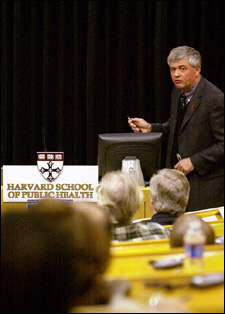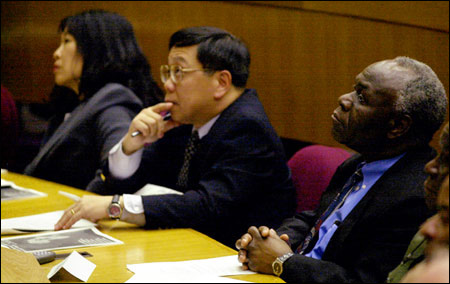Harvard researchers strategize about AIDS epidemic in Africa:
School of Public Health conference unites University efforts

In anticipation of World AIDS Day (Dec. 1), AIDS researchers and policy-makers from around Harvard gathered Nov. 25 to present their work and discuss strategies to address the devastating AIDS epidemic in sub-Saharan Africa. “Harvard Programs on AIDS in Africa: A University Responds,” sponsored by the Harvard AIDS Institute and held at the School of Public Health’s Snyder Auditorium, highlighted the significant and specific ways that Harvard’s resources are being plied to combat AIDS in Botswana, Nigeria, Senegal, South Africa, and Tanzania.
Nearly 72 percent of the world’s HIV infections are in sub-Saharan Africa, a region with just 10 percent of the world’s population, said Harvard AIDS Institute chair Max Essex, Mary Woodard Lasker Professor of Health Sciences and chair of the Department of Immunology and Infectious Diseases at the School of Public Health. Even more shocking, that region is home to 80 percent of the world’s HIV-positive women and 90 percent of the world’s HIV-positive infants. Essex and his colleagues – doctors and economists, researchers and policy-makers – discussed their efforts throughout Africa.
In addition, former President of the Republic of Zambia Kenneth David Kaunda spoke about AIDS in that nation, where he is also chairperson of the Kenneth Kaunda Children of Africa Foundation. He commended the transnational, multidisciplinary approach of Harvard’s various teams, stressing that the impact of AIDS goes beyond medical treatment or national borders.

“I sincerely believe that this gesture is a reflection of the humane policies of Harvard, as an institution, towards the greater humanity,” he said of Harvard’s work in Africa. “[Harvard’s] actions are, to all intents and purposes, in keeping with the biblical teaching to love thy neighbor as thyself. Your neighbor need not be the one next door or of the same color, race, ethnicity, or religion. Your concern for the well-being of your brothers and sisters in Africa is commendable.”




